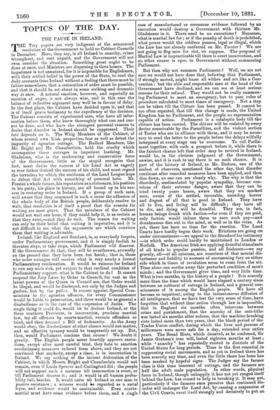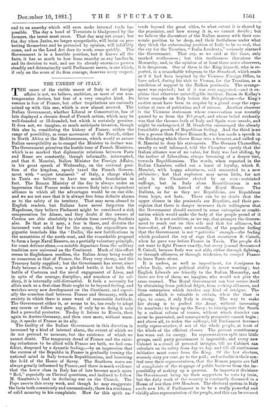TOPICS OF THE DAY.
THE PAUSE IN IRELAND.
THE Tory papers are very indignant at the announced resolution of the Government to hold no Cabinet Councils in December. Here, they say, is all Ireland in anarchy, crime triumphant, and rent unpaid, and the Government will not even consider the situation. Something great ought to be done at once, and Ministers are dispersing to their homes. The impatience is not unnatural, for it is impossible for Englishmen, with their settled belief in the power of the State, to read the daily accounts from Ireland without a feeling that there must be failure somewhere, that a restoration of order must be possible, and that it should be set about in some striking and dramatic way at once. A natural emotion, however, and especially an emotion of anger, is not always wise, and in this case the balance of reflective argument may well be in favour of delay. In the first place, the Cabinet have decided upon it, and that is of itself grave testimony to the expediency of the decision. The Cabinet consists of experienced men, who have all infor- mation before them, who know thoroughly what can and can- not be done, and who have the strongest personal reasons to desire that disorder in Ireland should be suppressed. Their fate depends on it. The Whig Members of the Cabinet, of whom several own Irish properties, fear as well as detest the impunity of agrarian outrage. The Radical Members, like Mr. Bright and Mr. Chamberlain, hold the cruelty which accompanies these outrages in impatient loathing. Mr. Gladstone, who is the moderating and conservative force of the Government, little as the stupid recognise that fact, must desire the success of his Land Act as eagerly as ever father desired the success of his child, and must regard the terrorism by which the residuum of the Land League hope to defeat that Act with something of personal hate. Mr. Forster's whole future, his reputation as a statesman, his position in his party, his place in history, are all bound up in his suc- cess in restoring order in Ireland. If a group of such men, well aware that they command in such a cause the adhesion of the whole body of the British people, deliberately resolve to wait, that resolution is of itself a proof that the reasons for waiting are most grave. That the members of the Cabinet would not wait one hour, if they could help it, is as certain as that they exist,—and they do wait. The reason for waiting can only be their belief that waiting is imperative, and it is not difficult to see what the arguments are which convince them that waiting is advisable.
Ireland, like England and Scotland, is, as everybody forgets, under Parliamentary government, and it is simply foolish to threaten steps, or take steps, which Parliament will disavow. If the Government do that, they will be overthrown, avowedly on the ground that they have been too harsh; that is, those who order outrages will receive what is very nearly a formal Parliamentary condonation. It would be ruinous for Ireland to run any such risk, yet subject to that cardinal condition of Parliamentary support. what is the Cabinet to do ? It cannot suspend the Jury Laws by Order in Council, for vast as the latent powers of the Queen in Council are, that Order would be illegal, and would be disobeyed, not only by the Judges and gaolers, but by the police. It cannot appoint Special Com- missions to try agrarian offences, for every Commissioner would be liable to prosecution, and there would be as general a disobedience as in the case of the suspension of Juries. The single thing it could do, would be to declare Ireland, or the three southern Provinces, in insurrection, proclaim martial law, try all offences by courts-martial, execute offenders .so tried, and then demand a Bill of Indemnity. As the Army would obey, the disobedience of other classes would not matter, and an effective tyranny would be temporarily set up. But, then, would Parliament condone that course ? We doubt it greatly. The English people never heartily approve execu- tions, except after most careful trial, they hate to sanction revolutionary measures ordered from above, and they are not convinced that anybody, except a class, is in insurrection in Ireland. We say nothing of the instant dislocation of the Cabinet, in which Messrs. Bright and Chamberlain would not remain, even if Lords Spencer and Carlingford did ; the people will not support such a measure till insurrection is overt, or till Parliament decrees it ; and it would in all human proba- bility fail, besides. It would unite all Ireland as one man in passive resistance ; a witness would be regarded as a social leper, and evidence would be unattainable. Even courts- martial must have some evidence before them, and a single
case of manufactured or erroneous evidence followed by an execution would destroy a Government with thirteen Mr.. Gladstones in it. There need be no executions ? Nonsense,. what is martial law for; or if the penalty of death is prohibited,. what power would the soldiers possess, legal or illegal, which. the Law has not already conferred on Mr. Forster ? We are not going to flog men for riot, we suppose. The proposal of Martial Law is impracticable till there is overt insurrection, and no other course is open to Government without summoning, Parliament.
But then why not summon Parliament ? Well, we are not sure we would not have done that, believing that Parliament, if strongly moved, might burst all withes and act like a Con- vention ; but the able and responsible men at the head of the• Government have declined, and we can see at least serious reasons for their refusal. They would not be really summon- ing Parliament to meet an emergency, but to pass rules of: procedure calculated to meet times of emergency. Not a step can be taken till the Cloture has been passed. It cannot be too often repeated, that till this change is made, the United Kingdom has no Parliament, and the people no representation capable of action. Parliament is a cataleptic body till the• clOture has been carried. The cloture will be resisted by every device conceivable by the Parnellites, and the violent section of Tories who are in alliance with them, and it may be neces- sary to send the latter to the people before the delays wilfully interposed at every stage can be overcome. To call Parlia- ment together, with such a prospect before it, while there is the faintest chance left that order may be revived in Ireland, would be, in the obvious judgment of the Government, unwise, and it is rash to say there is no such chance. It is part of the history of Ireland, as Mr. Dodson, one of the coolest of observers, mentioned the other day, that disorder continues after remedial measures have been applied, and then dies down, no one can see clearly why. The why is that the disorderly, unstimulated by popular sympathy, become con- scious of their extreme danger, aware that they can be tried twenty years hence, aware that they are marked. men, aware of the settled, incurable, unending horror and disgust of all that is good in Ireland. They have all to live, and living will be difficult ; they have all to die, and dying will be dreadful. They are, in fact,. human beings drunk with faction—for even if they are paid,. only faction would induce them to earn such pay—and drunkenness dies out in the mind, as well as in the veins. As yet, there has been no time for the reaction. The Land Courts have hardly begun their work. Evictions are going on under circumstances—we appeal to the Standard for testimony —in which order could hardly be maintained in London or Norfolk. The American Irish are applying dreadful stimulants of all kinds to popular passion, and all Irishmen—we say gravely, all—of all opinions, are conscious of that mental dis- turbance and liability to accesses of unreasoning fury on either side which in times of revolution seem to come from the air.. Time alone can soothe away this perturbed condition of men's minds ; and the Government gives time, and very little time- What is two months, in the history of a people ? It is scarcely more than the time which would have elapsed a century since- between an outburst of outrage in Ireland, and a general con- sciousness of it among the English people. We have all become so impatient, owing to the instantaneous diffusion of all intelligence, that we have lost the very sense of time, have forgotten that without time action through law is impossible, that in England six months often intervene between crime and punishment, that the anarchy of the anti-tithe war lasted six months after redress, that the machine-breaking. riots lasted more than two years, that the black period of the Trades Union conflict, during which the lives and persons of millowners were never safe for a day, extended over entire years. The Bread Riots, which daunted, as he confessed, Sir James Graham's iron will, lasted eighteen months at least ;. while •' anarchy " has repeatedly existed in districts of the United States for long periods. Time is the first essential in. suppressing social movements, and as yet in Ireland there has been scarcely any time, and even the little there has been has been marked by hopeful signs. The Judges say the farmer class is this time innocent of outrage, and the farmers are- half the adult male population. In other words, physical force in Ireland, though unhappily it has not yet ranged itself behind the Law, has ceased to help in breaking it. It may yet, particularly if the farmers once perceive that continued dis- order will endanger the Land Act, by causing a suspension of the Civil Courts, exert itself strongly and decisively to put an
end to an anarchy which will soon make internal trade im- possible. The day a band of Terrorists is bludgeoned by the farmers, the terror must cease. That day may not come ; but the_ day when Juries, no longer sympathetic, will insist on pro- tecting themselves and be protected by opinion, will infallibly come, and as the Land Act does its work, come quickly. The Government is in a horrible position, but it knows all the facts, it has as much to lose from anarchy as any landlords, and its decision to wait, and use its already enormous powers steadily and determinedly until Parliament meets, is one which, if only on the score of its firm courage, deserves every respect.







































 Previous page
Previous page